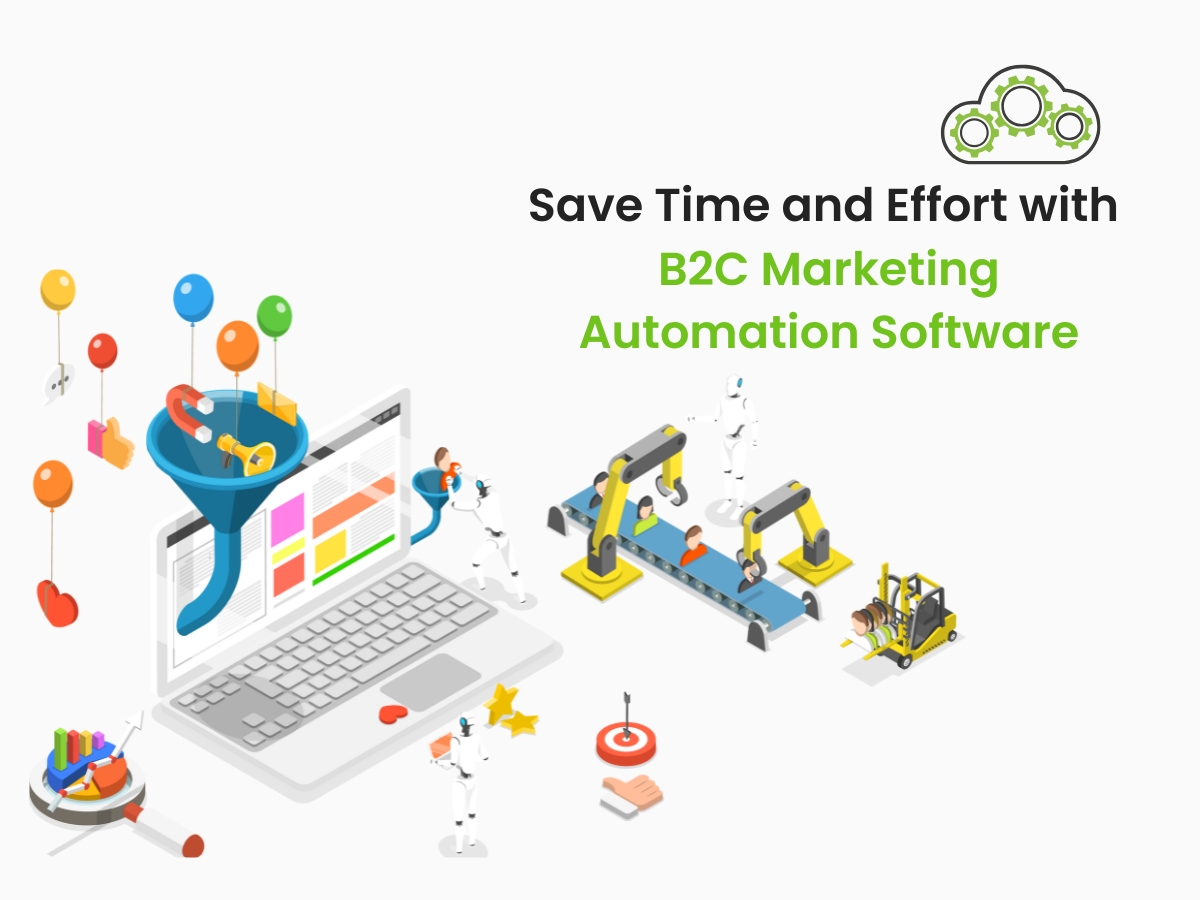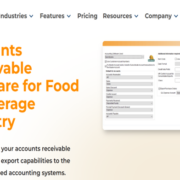Save Time and Effort with B2C Marketing Automation Software
Are you struggling to keep up with customer demands while juggling all your marketing tasks? You’re not alone. In 2024, the global marketing automation market is expected to reach 8.23 billion U.S. dollars. By 2032, it could more than double, surpassing 21 billion dollars. The rapid growth shows just how important automation has become for businesses of all sizes.
Marketing automation can help you work smarter, not harder. It allows you to automate tasks like sending emails and posting on social media while still delivering a personal touch. That way, you can spend more time with customers without wasting it on repetitive work.
In this blog, we’ll explore how B2C marketing automation software can boost your business. You’ll learn about its key benefits, important features to look for, and tips on how to choose the right software for your needs. Let’s get started!
What is B2C Marketing Automation Software?
B2C marketing automation software is a tool designed to automate and manage marketing tasks for businesses targeting individual consumers.
Centralizing marketing activities helps businesses reach a larger audience more efficiently while maintaining consistent messaging across multiple channels.
The software integrates multiple marketing channels into one marketing platform, making it easier to manage campaigns. For example, businesses can set up automated email flows based on customer actions or schedule social media content. The software keeps the marketing process smooth and consistent without needing constant manual input.
Marketing automation tools help businesses save time, reduce human error, and ensure more personalized customer interactions. With fewer manual tasks, entrepreneurs can deliver relevant content to their audiences at scale, improving engagement and efficiency.
Why Your Business Needs B2C Marketing Automation
In recent times, staying ahead of the competition requires a lot of things. B2C automation can help you achieve all of these goals by simplifying marketing tasks.
Here’s how automation can benefit your business:
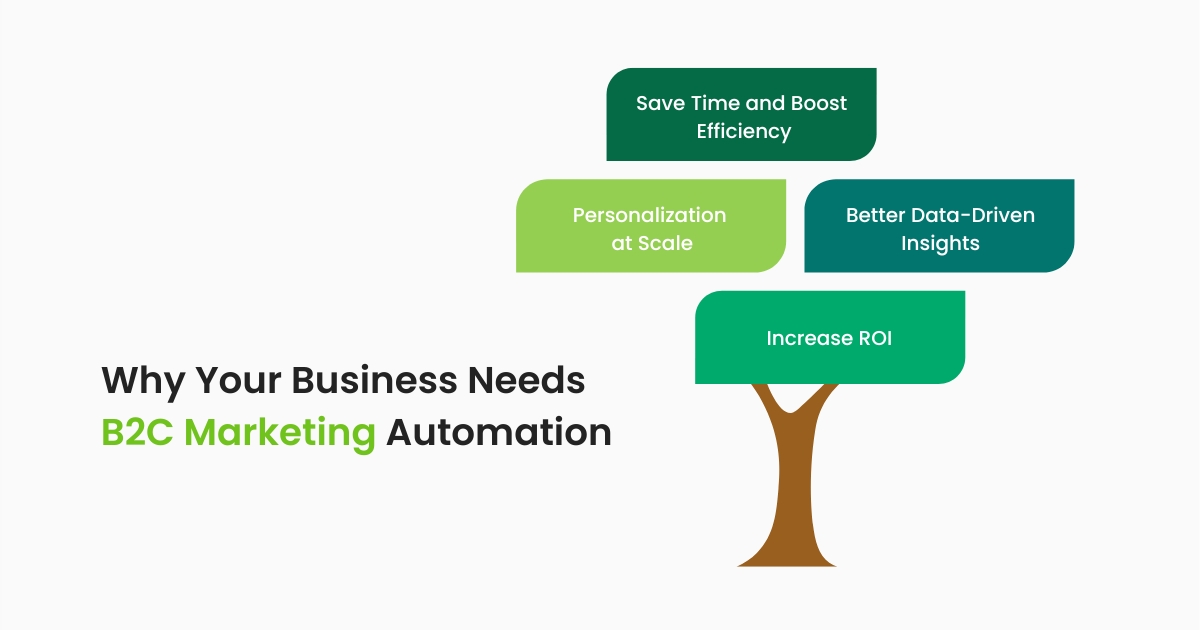
Save Time and Boost Efficiency
Automating routine tasks such as email campaigns, follow-ups, and social media posts allows your business to focus on more strategic initiatives. By removing the need for manual work, your team can dedicate their time to tasks that require creativity and critical thinking.
30% of marketers use automation to save time on their repetitive tasks, allowing them to concentrate on high-value activities like content creation and campaign optimization.
Personalization at Scale
One of the biggest advantages of marketing automation is that it creates personalized customer experiences, even when dealing with large volumes of data. Automation software uses customer data platforms to deliver targeted messages, making it easier to connect with the right audience at the right time. A retail marketing platform can further enhance this by helping brands automate campaigns, analyze customer behavior, and optimize engagement strategies.
For example, fashion retailers use automation to send personalized product recommendations based on a customer’s browsing history, which improves the chances of a purchase.
Better Data-Driven Insights
Marketing automation provides you with tools to track customer behavior, campaign performance, and engagement. The data allows businesses to fine-tune their strategies, improving both their short-term performance and long-term growth. The data can be integrated seamlessly with admin dashboards, simplifying workflows and improving campaign efficiency for businesses.
Suppose, an email campaign has a low open rate, the data can pinpoint potential issues like poor subject lines or incorrect audience segmentation, enabling quick adjustments.
Increase ROI
Automating marketing efforts can help your startup to increase return on investment (ROI). By targeting the right audience with the right messages, businesses can drive higher lead conversion rates. You can also maximize the effectiveness of their marketing spend.
Companies using marketing automation see a 77% higher conversion rate compared to those that don’t use automation.
Key Features of B2C Marketing Automation Software
When evaluating B2C marketing automation software, it’s important to understand the key features that make these tools effective. Let’s discuss some of the most essential features to look for in automation software:
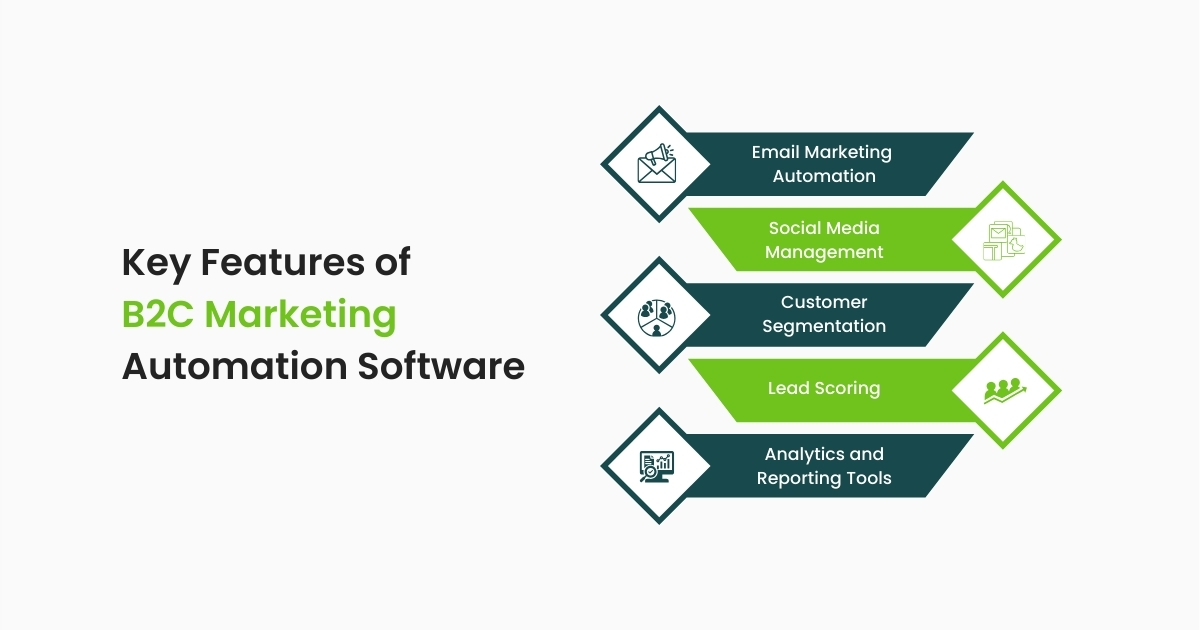
Email Marketing Automation
Email remains as a pillar of digital marketing. In recent times automation makes it even more powerful. With email automation, businesses can send personalized messages to their customers, saving time while boosting engagement.
Social Media Management
Managing social media accounts can be time-consuming, but automation makes it easier to schedule posts, track performance, and engage with followers. By automating these tasks, your business can maintain a consistent online presence and respond to customer interactions quickly.
Customer Segmentation
Effective marketing needs to target the right audience by behavior, preferences, or demographics. Marketing automation software helps businesses segment their customer base ensuring that each customer receives content relevant to their interests.
Lead Scoring
Lead scoring is a main feature in marketing automation that allows businesses to prioritize leads based on their capability to convert. By scoring leads based on your engagement level, you can focus your efforts on the most promising prospects.
Analytics and Reporting Tools
Data is the backbone of successful marketing campaigns. Automation software provides real-time analytics that measures key metrics, such as click-through rates and customer engagement, enabling businesses to adjust their campaigns for maximum results.
Choosing the Best B2C Marketing Automation Software for Your Business
Selecting the right B2C marketing automation software can be a difficult task, but understanding your business needs and going through lead features will help you make an informed decision.
Here are some important factors to consider when choosing a tool:
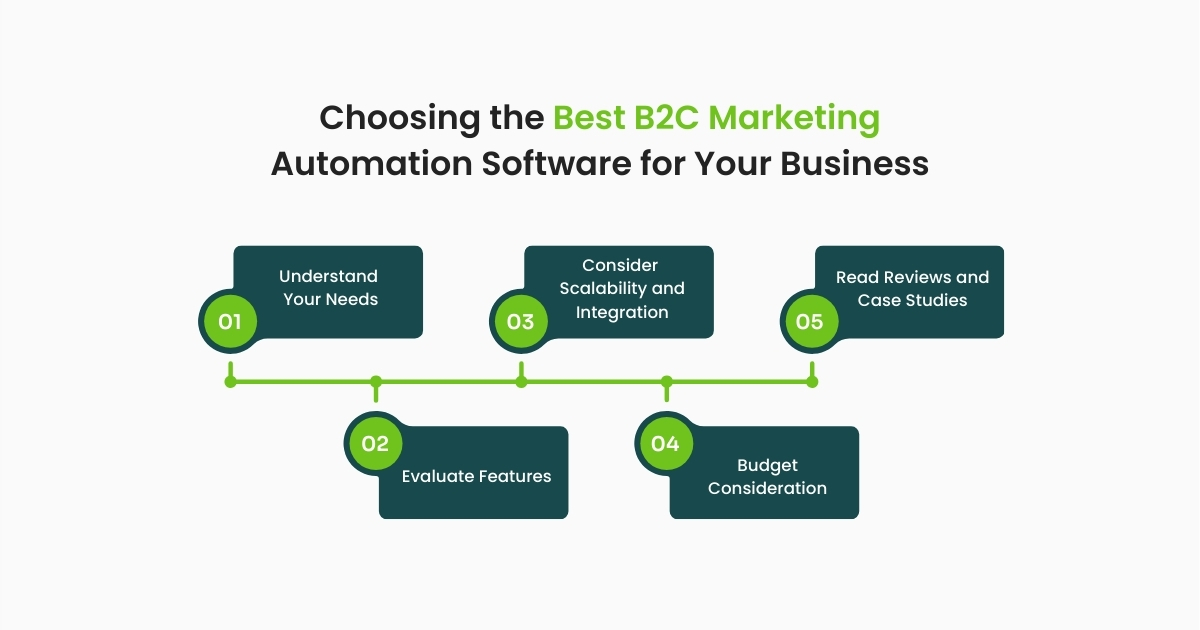
Understand Your Needs
Before selecting an automation tool, assess your specific marketing goals. Understanding your business objectives will help you in the long run. Are you focused on customer retention? Or do you want to improve your social media engagement? If you are not sure which path to follow, there is always the option to seek help from a fractional CTO as it will be both time and cost-effective.
Evaluate Features
Different marketing automation tools offer a range of features. Based on your goals, make a checklist of the must-haves, such as advanced customer segmentation or email automation, and evaluate which tools offer these features. Furthermore, you can go for custom software solutions, which will help you create automation software to meet your business-specific needs.
Consider Scalability and Integration
As your business grows, so choose software that can scale with your business and integrate seamlessly with other platforms like your CRM or e-commerce tools, ensuring smooth workflows and better efficiency.
Budget Consideration
Pricing varies greatly across different tools. Determine your budget and choose a solution that provides the best value for your business. Remember, investing in a premium solution may give you more features, but always evaluate its ROI.
Read Reviews and Case Studies
Research user reviews and case studies to see how others in your industry have used the software. Real-world success stories can provide valuable insights and help you determine whether the software is right for your business.
Case Study Snapshot
How Airbnb Increased Click-Through Rates by Using B2C Marketing Automation Software
When Airbnb was still in its startup phase, the company faced the challenge of scaling its marketing efforts to keep up with its expanding user base. To address this, Airbnb’s marketing team implemented marketing automation platform software to streamline its email marketing campaigns and deliver highly personalized messages to users.
By leveraging automation tools and b2b marketing strategies, Airbnb could differentiate and nurture its audience based on behavior, preferences, and past interactions, enabling it to send timely, relevant content at scale.
The strategy with automation, b2b and b2c resulted in a significant increase in email click-through rates within just a few months.
The automated system allowed Airbnb to re-establish customer journeys with users who had abandoned their bookings. They also send personalized travel recommendations and promote special offers specific to each individual. As a result, Airbnb saw a big rise in conversions and bookings, playing a crucial role in their fast growth.
Today, B2C marketing automation remains central to Airbnb’s marketing strategy, even as the company has evolved into a global brand.
Conclusion
B2C marketing automation software offers significant benefits for small businesses, particularly in terms of saving time and improving efficiency. By automating repetitive tasks, businesses can direct their efforts toward more strategic things, ultimately enhancing their bottom line.
To make the right choice, it’s important to address your business’s unique needs. Whether your goal is a better sales cycle, lead nurturing customers, personalized engagement, or improved lead management, understanding your priorities will help you select the best solution.
In conclusion, marketing automation can be a game-changer for business growth. By enhancing operations and enabling more targeted marketing efforts, businesses can increase conversions, improve customer loyalty, and position themselves for long-term success.
FAQs
How do I know if B2C marketing automation software is the right investment for my business?
To determine if marketing automation is right for your business, assess your current marketing workload and goals. If repetitive tasks take significant time, automation can boost efficiency and help focus on high-value activities.
Can B2C marketing automation software integrate with other business tools?
Yes, many B2C marketing automation tools integrate seamlessly with other platforms like CRMs, e-commerce systems, and analytics tools. It ensures a smooth workflow and better data synchronization across your business operations.
What are the common challenges when implementing B2C marketing automation?
Common challenges include data quality issues, resistance to change from staff, and integrating automation tools with existing systems. It’s important to invest time in training and ensure the tools fit your business needs.
How often should I review the performance of my automated marketing campaigns?
It’s best to review your automated campaigns at least once a month. Regular reviews help identify underperforming areas, optimize customer engagement strategies, and adjust your content and messaging based on real-time data.
Can B2C marketing automation tools handle multilingual and multi-regional campaigns?
Yes, many B2C marketing automation tools like active campaign or klaviyo support multilingual and multi-regional campaigns, allowing businesses to segment audiences based on geography and language preferences, ensuring that messages resonate with diverse customer bases.
